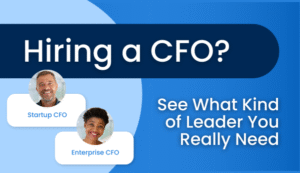Trish Saltys isn’t afraid of a mess. In fact, she’s built her career on untangling them.
From stabilizing multi-million-dollar businesses on the brink of collapse to reimagining legacy systems in PE-backed firms, Trish Saltys has built her career on stepping into ambiguity and emerging with structure, strategy, and results. Currently the COO of Toronto Film School, she’s a seasoned operator with a finance lens, a builder’s mindset, and a strong bias toward action.
In her recent conversation on The Next Moves with Joe Diubaldo, President & Founder of Clarity Recruitment, Trish shares how her unconventional path from small-town Saskatchewan to leading change across some of Canada’s most recognized brands was shaped by both serendipity and bold yet intentional decision-making.
Prairie Roots and a CPA Foundation
Trish’s career story starts on a farm in a 200-person town in Saskatchewan, a place where, “community was important and work ethic was tantamount.” That prairie upbringing gave her the kind of grit, directness, and resilience that would go on to define her leadership style in high-pressure business environments.
She trained as a CPA at the University of Saskatchewan and began her career articling with PwC in Saskatoon. But early on, she realized that public practice wasn’t where she thrived. “You’re always looking in the rear-view mirror,” she says. “You’re telling the owner something they already know – how last year went.”
What she really wanted was to be in the business, not beside it. So, she made the jump.
Entering Industry: From Culture Shock to Career Catalyst
Her first role out of public practice was a culture shock: she joined Bruce Allen Talent, the firm managing music legend Bryan Adams. It was, as Trish describes, “the polar opposite of PwC.” But it also marked the beginning of a long line of roles where she would help companies professionalize, scale, and transform.
With a business partner, she helped implement new systems, processes, and professional standards. “We were brothers in arms,” she says. “We helped the business become more than it was when we started.”
This was also where her reputation as a “fixer” began to take shape. She was the one brought in when a business needed structure, systems, and a steady hand. But her directness, what she calls a Saskatchewan trait, wasn’t always easy to navigate.
“I haven’t always had the finesse needed,” she admits. “But I trust my judgement. I feel it’s important for someone to say, ‘Here’s what I think, and here’s where we can do better.’”
Growing Through Great Leadership
One of the most formative chapters of Trish’s career came at GT Group Telecom under the leadership of Bob Wolf, a former Goldman Sachs executive brought in to stabilize the struggling business. “He was one of the best bosses I ever had,” she says.
Under Wolf’s guidance, Trish was involved in high-impact work including private equity rounds, high-yield offerings, and eventually, taking the business public. “I traded sweat for learning,” she recalls. “It was self-mentoring. If you show up, work hard, and stay humble, good leaders will invest in you.”
This time marked a huge inflection point in her career. “You have to be willing to take jobs that are a little above you and grow into them,” she says. “Those are life-changing experiences.”
Crisis as Catalyst: The 1-800-GOT-JUNK Story
Trish Saltys’ time at 1-800-GOT-JUNK is one of the clearest examples of her ability to step into crisis and create clarity. Recruited by a former CFO she had worked with, she was brought in when the advisory board suspected the business was facing issues but couldn’t identify what exactly was wrong. It didn’t take long for Trish to uncover the truth: the business was fundamentally illiquid.
The company had overextended itself with lavish office renovations, expensive leases, and an assumption that rapid franchise growth would continue indefinitely. “We were operating like we still had more upside ahead, but the cash flow told a different story,” she explains.
Working quickly, she restructured spending, tapped into her banking network, and secured mezzanine financing to stabilize operations. Once the immediate financial triage was complete, a new president was brought in, and together they built a more sustainable path forward.
PE vs. Founder-Led: Why Structure Matters
When asked whether she prefers working in founder-led companies or PE-backed environments, Trish is clear: “I wouldn’t go back to a founder-led company without a PE partner at the table.” Why? In founder-led companies, professionalization is often an uphill battle. “There’s a bias toward underinvesting in systems, people, and information,” she says. “You’re often the lone voice trying to advocate for change, and that’s hard.”
In contrast, private equity brings not just capital, but alignment. “PE firms understand that to scale, you need systems, process, and strong teams,” she explains. “They empower you to make the necessary investments. They’re in it for the long game.”
That said, not all PE is created equal. “There are the rip-and-flip types, and then there are patient capital investors who want to build something meaningful,” Trish notes. “You have to understand which one you’re working with.”
Rebuilding from the Inside at Kraus Flooring
At Kraus Flooring, Trish faced a different kind of challenge, one rooted in visibility and morale. The company was in breach of financial covenants, and everyone knew it: employees, customers, the surrounding community. In an environment like that, hiring external talent is tough. So, Trish looked inward.
“I searched for the ‘bright lights.’ Those people internally who were still engaged, still trustworthy, and still wanted to be part of the solution,” she says. “You support them. You stretch them. And you operate with full transparency.” Daily meetings, a steady cadence, and high-clarity communication helped stabilize the company during an incredibly fragile time.
Embracing a New Challenge: The Toronto Film School
Today, Trish is the COO of Toronto Film School, and it’s the role she says has brought her the most joy despite never seeing herself as a fit for it at first.
“I joined as Interim CFO for Yorkville University, and within two weeks, the CEO suggested I lead the film school,” she laughs. “I didn’t think I was the right person. But it turns out, I love it.”
What she found was a school with immense potential but stagnant growth. Despite dedicated faculty and a strong culture, programs hadn’t been meaningfully updated in years, and leadership roles were misaligned.
Trish went to work. She restructured teams, modernized curriculum, and set a forward-looking strategy. The next chapter? Growth – especially as the film industry evolves with AI and emerging tech.
“It’s the best job I’ve ever had,” she says. “And I would’ve never applied for it on my own.”
Advice for Future Leaders: Apply Anyway
Trish ends the interview with a message, especially for women in leadership: “Don’t be afraid to apply for roles you think are too big,” she says. “Every role I’ve taken felt like a stretch. But I worked hard, learned fast, and succeeded. Nobody checks every box. Don’t count yourself out.”
Trish Saltys’ career is proof that success doesn’t always follow a linear path. It’s about stepping into the unknown, owning your strengths, and having the courage to drive change even when it’s hard.
Whether you’re navigating founder dynamics, preparing for a PE partnership, or leading a turnaround, the lesson is clear: It’s not just about managing what is. It’s about building what could be.
Need help hiring or finding the next right career move?







